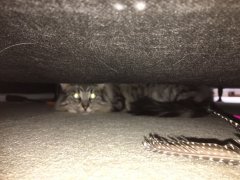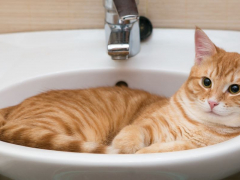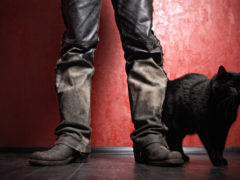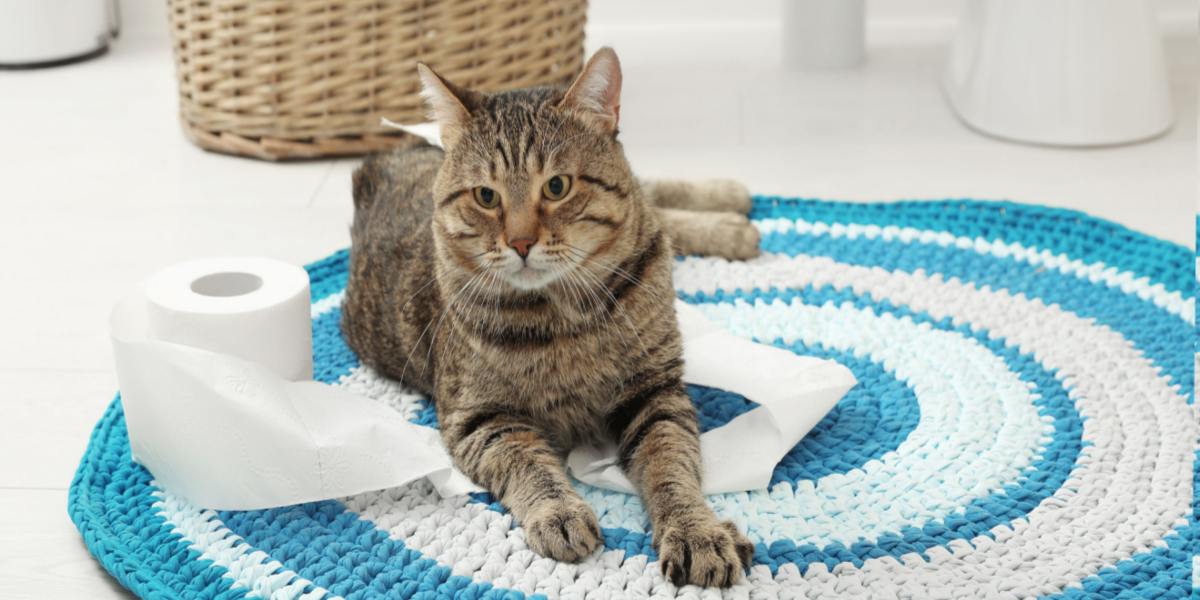
Inappropriate urination is one of the most common behavioral problems seen in cats. It is generally fairly easy to train a cat to use a litter box, so it can be very frustrating when they urinate elsewhere, and bathroom rugs seem to be a common choice.
Inappropriate urination can de due to a medical condition, territory disputes, stress, or problems with the litter box. So why do our cats start this habit, and how can we discourage them?
If you have discovered that your kitty is urinating on your bath mat or carpet, it can be instinctive to think of your cat’s behavior as being naughty, or spiteful, but it is important to remember that this is not the case.
The behavior may be undesirable, but there is usually a good reason for it, and it is worth finding out what your cat is trying to tell you.
4 Common Reasons Why Do Cats Like to Pee on Bathroom Rugs
1. Problems With The Litter Box
Cats are fastidious creatures and can be fussy about their litterbox. They are sensitive to odors, and cat pee has a very specific scent. If your cat has started avoiding the toilet and urinating elsewhere, it is a good first step to ensure their litter tray is fully suitable for all their needs.
Consider the following kitty concerns:
Cleanliness
This may seem basic, but cats like a clean litter box. If you are not changing your cat’s litter as often as perhaps you should (life is busy, we understand!) your cat may decide to toilet elsewhere. Try and empty out dirty litter as often as possible, and clean your cat litter box with soap or a cat-friendly detergent regularly.
Location
Privacy is important to our cats, and they don’t want to be competing for quiet time in the litterbox. Make sure there are plenty of litter trays available in different, quiet locations. If you get a new cat, which can trigger toilet problems for an existing cat, it is particularly important that there are multiple, clean litter trays available in different areas of your house.
Litter
Cats tend to become very attached to one particular type of litter. If you decide to buy a different type, try and ensure a gradual change as a sudden new substrate may put your cat off their litter box entirely.
Size and Type
Think about your litter tray – is it big enough for your cat? For example, a Maine Coon will need a larger tray than the standard size. Can your cat easily get in and out of the tray? The litter box needs to be accessible and suitable for your individual pet.
2. Territory Urine Marking
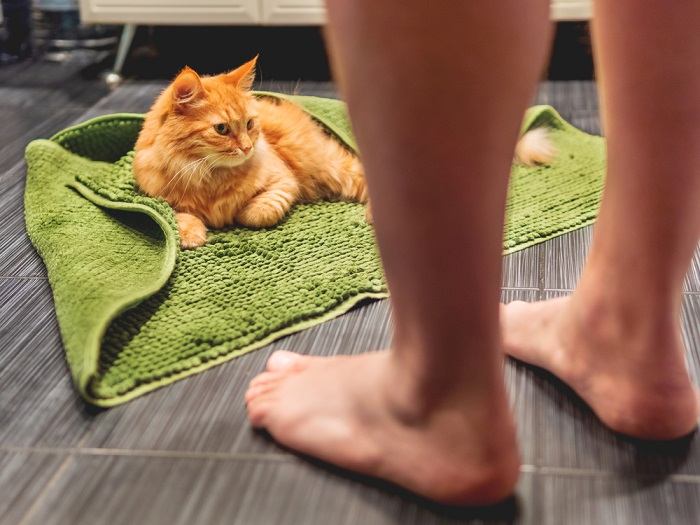
Cats communicate a lot using scent, and cats’ urine contains pheromones and other scent communications.
Felines are territorial animals, and urine spraying is a normal part of a cat’s behavior. However, it is undesirable to their owners! Understanding this behavior can help to manage it.
Cats communicate a lot using scent, and cats’ urine contains pheromones and other scent communications which help them let other cats know about their territory, their boundaries, and their intentions.
If your cat is urinating as a form of communication, they will usually spray urine onto a vertical surface. Cat spraying is usually found in obvious places – they want it to be found and sniffed! – but occasionally small amounts of urine found on a horizontal surface such as a carpet or bathroom rug can also be found.
If you have a kitten, they may start urine marking as they become more mature. This behavior is more common in male cats who are still entire but is also seen in females. Males tend to have larger territories but both sexes use urine spraying to communicate. Neutering will help to diminish this behavior.
Adult neutered cats may still use urine marking. The most common scenario is if there is a new pet in the household, the existing cats may urine spray to communicate their territorial boundaries. Disputes can often occur in multi-cat households.
If you think your cat may be spraying as a territorial instinct, clean the area with an enzymatic cleaner (normal detergent or soap will not fully mask the scent) and ensure that all cats have access to at least one clean and private litter tray, food, water, and a safe sleeping space.
3. Health Problems
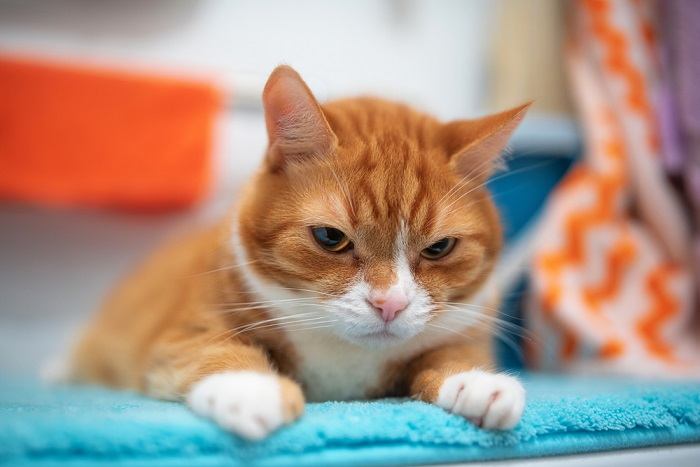
Frequent Urination may mean your cat stops using their litter tray.
There are some medical issues that may mean your cat stops using their litter tray.
Frequent Urination
If your cat has a medical condition that causes them to urinate frequently, such as diabetes, kidney disease, or hyperthyroidism, they may struggle to make it to the litter tray.
Pain and Discomfort
Cats are prone to an inflammatory illness of the urinary tract called Feline Lower Urinary Tract Disease (FLUTD) in which the bladder can be sore and inflamed, leading to discomfort when urinating.
This can also predispose to other medical causes of urinary pain such as a urinary tract infection (UTI) or even a bladder infection. If your cat begins to associate trips to the litter box with pain, they may start urinating elsewhere, such as on your bath mat.
Cognitive Decline
Elderly cats can suffer from cognitive dysfunction, similar to human dementia, which can lead them to forget their litter tray, or just be caught short, leading to inappropriate urination. They are also more susceptible to infections.
If you are unsure if your cat has a medical condition, keep a close eye on their frequency of urination (cats should pee around three times daily), any change to the color, smell or look of their urine, and for any other symptoms such as drinking more or hiding away.
A trip to the veterinarian is a good idea to rule out health problems if your cat has started peeing on your bathroom rug. They can perform urinalysis and check for things like crystals in the urine causing concern.
4. Behavioral Problems
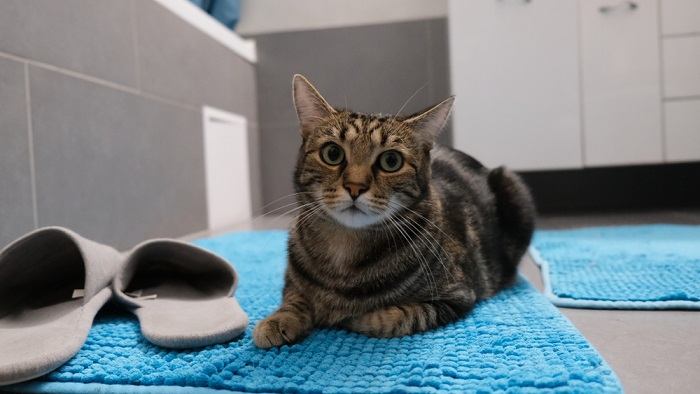
Stress urination is most common in male cats, and cats from multi-cat households.
Inappropriate urination can be a sign of stress and anxiety in felines. Your cat may be peeing on your bath mat due to worry about another pet, a new cat in the area, anxiety about their litter tray, or as a way to provide a comforting ‘own’ scent to themselves.
Cats aren’t big fans of change, so any difference in their environment can be a source of concern for them. Stress urination is most common in male cats, and cats from multi-cat households.
If medical causes have been ruled out, and you’re concerned your cat is dealing with kitty anxiety, make sure they have access to key resources (water, food, toys, beds, and a clean litter tray) in their ‘core area’ – the space they spend most of their time. Diffusers of synthetic pheromones, calming supplements, and plenty of TLC can all help reduce your cat’s stress.
Conclusion
If you have smelly bathmats due to your delightful cat deciding to use them as a toilet, this is not an uncommon kitty problem. There are various causes for inappropriate urination, including medical concerns. A trip to your veterinarian is a good first step.
If health problems have been excluded, check that there are no problems with your cat’s litter trays, any evidence of stress or anxiety, and consider that they may be urine spraying (especially if unneutered) to mark their territory.
Also Read: The 11 Best Non-Clumping Cat Litters
Frequently Asked Questions
How can I get my cat to stop peeing on my rugs?
First, understand why they are urinating outside the litter box – is their tray accessible and clean? Are they unwell or in pain? Are they marking territory, or stressed?
Once you’ve eliminated the cause, clean the area thoroughly with an enzymatic cleaner and prevent your cat from accessing the area for a short time to break the habit.
Why did my cat pee on the bathroom floor?
Your cat may be protesting if their usual litter tray is not up to their top standards of cleanliness, or getting a bit smelly. They may also urinate in odd places due to medical issues or stress. Cats can also urine spray in odd places to scent mark their territory, especially if they share their home with other cats, or are unneutered.
What smells deter cats from peeing?
Citrus scents and vinegar can both be off-putting to cats. However. if your cat is urinating in an inappropriate place, the best deterrent is to find out why they are performing this behavior, and correct the underlying cause. You will also need to clean the affected area with an enzymatic cleaner, to remove any traces of urine and odors.

